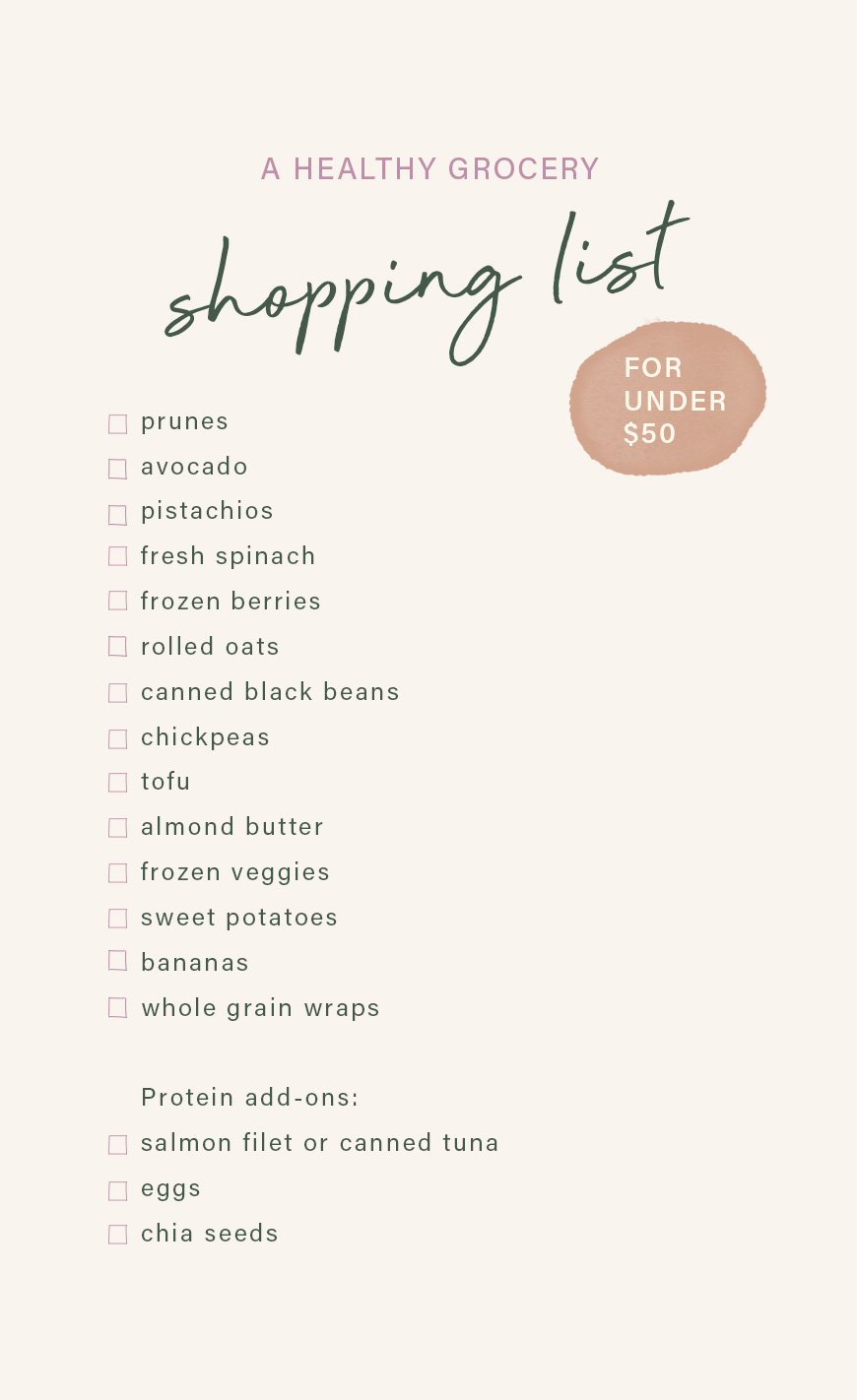
February 07, 2020 at 07:00PM by CWC
Walking into the grocery store without a plan of attack (also known as a “shopping list”) is a calculated risk. With so many shiny-new products hitting the shelves every single week, breaking the bank at Trader Joe’s or your supermarket of choice has become as easy as snatching up a free sample. That’s why registered dietitian and best-selling author Erin Palinski-Wade, RD, never enters the sliding glass doors of the supermarket without a budget-friendly healthy grocery list.
To get you started with shopping for frugal, healthy ingredients, Palinski-Wade wrote up a list that will cost you a mere $50. In addition to 14 core plant-based food items everyone should shop for, she also budgets for a few optional protein add-ons that fits into plant-forward diets (like the Mediterranean Diet or Paleo), as well as vegetarian and vegan diets. Over time, you’ll get the hang of swapping items out for similarly priced alternatives (for example, canned black beans for canned pinto beans)—so no need to fear flavor boredom.
Keep reading for a dietitian’s 17-item healthy grocery list on a budget

Fresh produce to add to your healthy grocery list
1. Prunes: “Lower in naturally-occurring sugar than other dried fruits, prunes contain three grams of fiber per serving and only 100 calories. Eating five to six prunes per day may help to prevent bone loss,” says Palinski-Wade. To boot, ground prunes can acts as sugar substitutes in your favorite desserts—so don’t let your grandma have all the fun.
ADVERTISEMENT
ADVERTISEMENTKate Spade Autumn/Winter Sale |
Dietitian’s pick: Sunsweet Amazin Prunes ($12 for 16 oz.)
2. Avocados: The infamous avocado makes the list because of its fiber content (there are over six grams in just half of a fruit) and its heart-healthy monounsaturated fat. Whether you go basic and spread it on toast, blend it into smoothies, or smash it into brownie batter, you could never go wrong.
Dietitian’s pick: Your choice! (about $2 per pound)
For more intel on avocado’s many healthy benefits, check out this review from a registered dietitian:
3. Bananas: “Bananas are one of the easiest on-the-go snack options you can find while being incredibly affordable,” says Palinski-Wade. The potassium found in bananas helps your body balance out sodium.
ADVERTISEMENT
ADVERTISEMENTSports Direct Free Delivery on All Orders! |
Dietitian’s pick: Your choice! (less than $1 per pound)
4. Sweet potatoes: Antioxidants in the form of vitamins A and C make sweet potatoes a supermarket superstar—and so does their low, low price point.
Dietitian’s pick: Your choice! (about $1 per pound)
5. Fresh spinach: “Fresh spinach on hand is a staple for so many recipes. You can use it as a base for your salads, add it into a morning smoothie, or sauté it for a nutrient-packed side dish at any meal,” says Palinski-Wade
Dietitian’s pick: Your choice! (about $4 per pound)
Whole grains you should always buy
6. Rolled oats: Palinski-Wade is a fan of eating rolled outs at breakfast—or as a snack. “With only one ingredient—whole grain oats—they are rolled and steamed thinner than other oats so they can cook quick, but still provide the perfect texture for a thick and creamy oatmeal,” she says. Half a cup offers five grams of protein and four grams of fiber.
Dietitian’s pick: Bob’s Red Mill’s Quick Cooking Rolled Oats ($12 for four bags)
7. Whole grain wraps: “I love keeping fiber-rich, whole grain wraps on hand. You can make everything from a breakfast burrito to a wrap to a veggie taco with them, which makes meal prep a breeze,” says Palinski-Wade.
Dietitian’s pick: Flatout Flatbread Original (about $3)
Pantry items for affordable meals
8. Black beans: To stuff your aforementioned breakfast burrito, you’ll definitely need black beans. “Beans are rich in both protein and fiber and make a perfect addition to any meal. Try using them as a salad topper, adding into stir-fries, or even using pureed beans as a meat-extender in a recipe to cut down on the amount of meat needed in recipes such as meatloaf,” suggests the dietitian.
Dietitian’s pick: Bush’s Black Beans ($1)
9. Chickpeas: “Just like black beans, chickpeas can add a boost of protein and fiber to many dishes from salads to pastas. You can also season and roast chickpeas for a delicious crunchy snack packed full of nutrition,” Palinski-Wade says.
ADVERTISEMENT

ADVERTISEMENT
Anya Hindmarch - I AM A PLASTIC BAGDietitian’s pick: Bush’s Garbanzo Chickpeas ($1)
Chickpeas are the hottest legume on the block. Here’s what you need to know about them:
10. Pistachios: “I always recommend having pistachios on hand for a filling, nutrient-rich protein source,” says Palinski-Wade. “As one of the highest protein snack nuts, pistachios are packed with good for you mon and polyunsaturated fats and six grams of plant-based protein per serving, making them a great grab-and-go snack option. And unlike meat-based proteins, they are cholesterol-free and a good source of fiber.”
Dietitian’s pick: Wonderful Pistachios Lightly Salted No-Shells ($7)
11. Almond butter: Of all the nut butters on the market (and, oh boy, there are many), Palinski recommends almond. “In just two tablespoons, almond butter provides 17 grams of plant-based fat, three grams of fiber, and seven grams of protein, making it a filling option that is packed full of nutrition,” she says.
Dietitian’s pick: 365 Value Creamy Almond Butter ($7)
Frozen items for your healthy grocery list
12. Frozen veggies: “Keeping frozen vegetables on hand is an affordable way to always ensure you have nutritious produce at every meal. Since frozen veggies are picked at peak ripeness, they contain just as many nutrients—or more—than their fresh counterparts, but last even longer and are more affordable when out of season,” says Palinski-Wade.
Dietitian’s pick: Green Giant Steamers Frozen Cut Asparagus ($3)
11. Frozen berries: Palinski-Wade ordains berries a “nutritional powerhouse.” Similar to frozen veggies, they’re packaged at peak ripeness and ready to eat whenever you’re craving raspberries or lusting after strawberries.
Dietitian’s pick: Gather & Good Organic Frozen & Sliced Strawberries ($3)
Plant-based proteins
14. Tofu: “Keeping tofu on hand makes it easy to whip up a quick stir-fry for a protein-rich meal, or even blend it into a smoothie to help you feel satisfied for hours to come,” says Palinski-Wade.
Dietitian’s pick: Nasoya Extra Firm Tofu ($3)
Optional protein add-ons to consider
By now, your haul should add up to around $42. (You did it! Yes!) Now, Palinski-Wade says you can supercharge your list with an extra source of protein that adheres to your diet. Ready?
15. Salmon filet or canned tuna: For animal-based protein sources, Palinksi-Wade loves fish for its healthy fats. “Whether you enjoy a fresh salmon filet or choose canned tuna, adding lean protein from fish to your diet twice a week can help you to meet your daily omega-3 fatty acid needs, which are beneficial to the health of your brain and heart,” says the dietitian.
Salmon ($6 to $20 per pound), canned tuna (about $1 per can)
16. Eggs: If you’re vegetarian, you can’t beat eggs as your source of extra protein. “This lean protein is incredibly versatile and can be used in recipes from baked goods to desserts as well as serve as the main entrée for any meal of the day. Eggs are also a low-cost, complete protein, making them perfect for the budget-friendly shopping list,” says Palinski-Wade.
About $2 a dozen
Eggs are nature’s multivitamin, BTW:
17. Chia seeds: “I love recommending chia seeds to a vegan diet. Not only are these seeds rich in protein (four grams per ounce), but they are also high in fiber (2 grams per ounce) making them beneficial for digestive health as well. Chia can be easily added into baked goods but can also serve as structure in vegan recipes as a replacement for gelatin or even eggs,” says Palinski-Wade.
So you’ve got your $50 worth of groceries—now what do you cook?
It happens sometimes: You get home from the supermarket with lots of foodstuffs… and no bloody idea what to cook. To help you get started, Palinski-Wade dreamt up two easy recipes to add to your rotation.
1. Overnight Almond Butter Prune Oats: “The night before, add oats, water, prunes, and nut butter together into a mason jar. Allow it to sit in the refrigerator overnight. In the morning, stir to mix ingredients and enjoy cold—or warm up quickly in the microwave—for a high-fiber, filling breakfast on the go,” says the dietitian. You can also swap out the prunes for your frozen fruit of choice to vary the flavors you’re eating day by day.
2. Simple salad: The ingredients on your $50 list are prime ingredients for a not-boring-at-all salad. “Top fresh spinach with sliced avocado, black beans, and pistachios along with your favorite dressing for a savory, crunchy salad that will keep you satisfied for hours,” says the dietitian.
Confused about plant-based eating? Here’s what dietitians want you to know—and how to meal prep using almost all fruits and veggies.
Author Kells McPhillips | Well and Good
Selected by CWC

ADVERTISEMENT
ADVERTISEMENTUp to 30% off Gift Sets |








